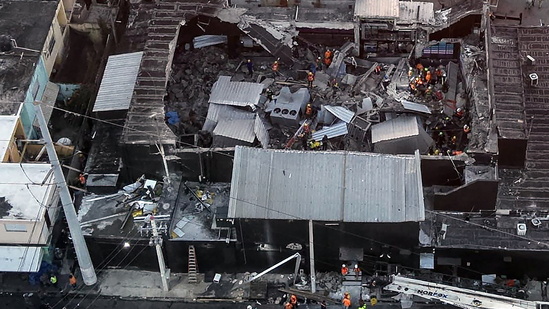Tragedy, Repentance, and the Gift of Now
The music pulsed, the crowd, lost in the moment surged, and then, without warning, the roof gave way. Monday night in Santo Domingo became a scene of unimaginable horror as the Jet Set Club, a place meant for celebration, crumbled. In the aftermath, amidst the grief and confusion, a profound question echoes: Why? It’s a question that has haunted humanity for centuries, and one that Jesus himself addressed in a similar context. The ancient words of Luke 13:1-5 speak with startling relevance to our modern tragedies, urging us to look beyond simplistic explanations and confront the urgent reality of our greatest need.
The Tragedy in Santo Domingo:
The details of the collapse are still emerging, but the picture is devastating. On Monday night, at the Jet Set Club, a popular venue in Santo Domingo, the roof suddenly caved in during a performance. The scale of the tragedy is immense. As of now, at least 113 lives have been tragically cut short, and countless others have been injured, some critically. The impact of this event has rippled through the Dominican Republic, touching not only the lives of ordinary citizens who sought an evening of entertainment, but also deeply affecting the artistic, athletic, and political spheres, as prominent figures were among the victims. The nation’s shock and sorrow are palpable, leading the President to declare three days of national mourning, observed on the 8th, 9th, and 10th. While the city reels from the loss, rescue efforts continue.
A particularly poignant detail of this tragedy involves Ruby Perez, a beloved artist who was performing at the club that night. It has been recorded that Perez had expressed a desire to transition to creating Christian music. In interviews and public statements, he mentioned his intention to leave his current genre and produce music that would reflect his faith. Whether this indicated a full commitment to Christ or simply a change in artistic direction, we cannot definitively say. But the fact remains that, the opportunity is now lost. This powerfully illustrates that “someday” is not a guarantee, and we must not delay in responding to the call to repent and believe. The fragility of life is laid bare, and we are left with the haunting question: what if?
Understanding Luke 13:1-5:
The words of Jesus in Luke 13:1-5 take on a new weight in the context of such a tragedy:
At that time, some people came and reported to him about the Galileans whose blood Pilate had mixed with their sacrifices. And he responded to them,
“Do you think that these Galileans were more sinful than all the other Galileans because they suffered these things? No, I tell you; but unless you repent, you will all perish as well.
Or those eighteen that the tower in Siloam fell on and killed—do you think they were more sinful than all the other people who live in Jerusalem?
No, I tell you; but unless you repent, you will all perish as well.”
– Luke 13:1-5 (CSB)
To understand Jesus’s response, we must grasp the prevailing mindset of his day. Many Jewish people held a strong belief that suffering was a direct consequence of individual sin. If someone experienced misfortune, it was often assumed they had committed some egregious act that warranted divine punishment. This is evident in other passages, such as the disciples’ question about the blind man in John 9:2.
Jesus, however, challenges this simplistic equation. He acknowledges the reality of sin and its ultimate consequences, but he reframes the conversation. In Luke 13, he doesn’t dwell on the specific sins of the Galileans or those killed by the falling tower. Instead, he uses these events to deliver a powerful and urgent message to his audience: “Unless you repent, you will all perish as well.”
The word “repent” (Greek: metanoeō) is key here. It means more than just feeling sorry for one’s actions. It signifies a change of mind, a fundamental shift in one’s perspective, and a turning away from sin and a turning toward God. It’s a transformative reorientation of the entire person, both inwardly and outwardly. Jesus isn’t offering a philosophical discussion on the nature of suffering; he’s issuing a call to action, a desperate plea for a life-altering response. His repetition of the warning emphasizes the gravity of the situation. He’s saying, in essence, “Don’t get caught up in trying to explain their fate. Focus on yours.”
Connecting the Santo Domingo Tragedy and Luke 13:1-5:
The parallels between the events in Luke 13 and the Santo Domingo Jet Set Club collapse are striking. Both involve sudden, unexpected death. In both cases, there’s a natural human tendency to ask why. Was it punishment? Was it random? Was it simply a tragic accident?
Jesus’s response in Luke 13 compels us to move beyond these initial questions. While investigations into the cause of the collapse are necessary, the overarching message of Jesus reminds us that these events should serve as a stark reminder of our own mortality. Just as those Galileans and the victims of the tower of Siloam faced sudden death, so too do we all live with the reality of our own impermanence.
The story of Ruby Perez adds another layer of gravity to Jesus’s message. He had expressed a desire to create Christian music, to shift the focus of his work. Whether this indicated a full commitment to Christ or simply a change in artistic direction, we cannot definitively say. But the fact remains that he postponed this change, and tragically, the opportunity is now lost. This powerfully illustrates that “someday” is not a guarantee. The fragility of life is laid bare, and we are left with the haunting question: what if?
The Church’s Response and Our Call to Action:
In the aftermath of the Santo Domingo tragedy, the church has a vital role to play. Our first response must be one of deep compassion. We are called to weep with those who weep, to offer practical assistance to those who have lost loved ones, and to provide a tangible demonstration of Christ’s love in a time of immense sorrow.
But we must also be faithful to Jesus’s message. While offering comfort, we cannot shy away from the truth that every life is precious and that eternity hangs in the balance. This is a moment to gently, yet firmly, call for repentance and faith. We must point people to the hope that transcends earthly loss, the hope of salvation and eternal life offered through Jesus Christ.
This tragedy should also shake us from any complacency in our own lives. Are we delaying obedience? Are we postponing service? Are we putting off reconciliation? Luke 13 and the story of Ruby Perez urge us to examine our hearts and respond to God’s prompting today.
Conclusion:
The collapse at the Jet Set Club in Santo Domingo is a stark reminder of life’s fragility. Coupled with the story of Ruby Perez’s deferred artistic plans, it echoes the urgent call of Jesus in Luke 13:1-5. May it move us to genuine faith, a deeper commitment to Christ, and a renewed passion to share the gospel, while there is still time.



As I read this post, I weep with those who weep. I cannot imagine the suffering of the people involved there in the Dominican Republic. I’m sure there are folks who are in need tons of help in every metric available. I so appreciate your dusting yourself off of the personal grief you are experiening for your countrymen and seeing with eyes to see the true need. You have stated this much better than I could. Blessings to you as it sounds like ministry bells are clanging.